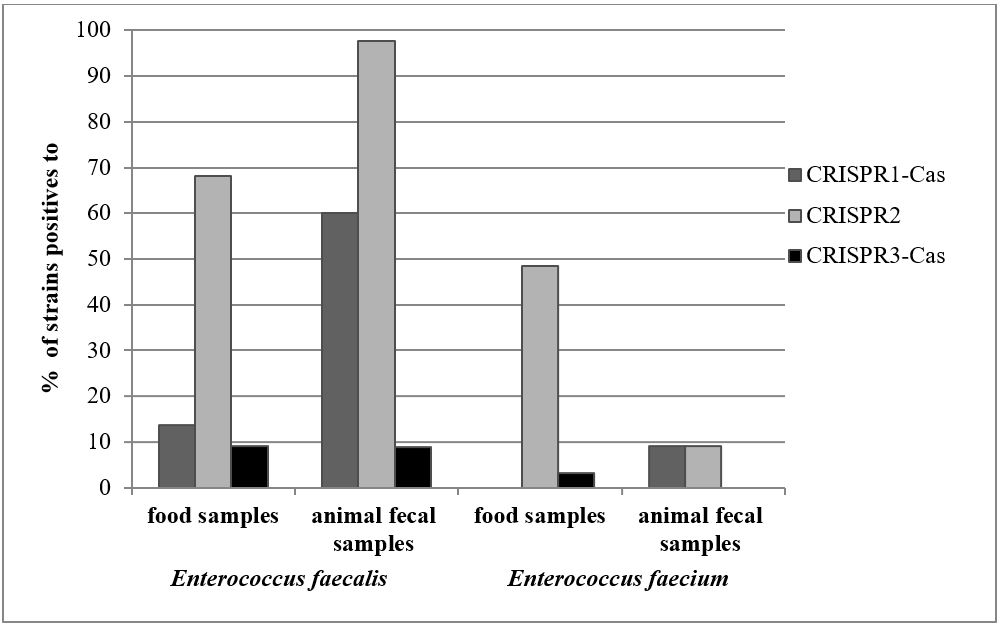|
E. faecalis
|
Vegetables
|
11 |
Riboldi et al. (2008) RIBOLDI, G.P., MATTOS, E.P., FRAZZON, A.P.G., D’AZEVEDO, P.A. and FRAZZON, J., 2008. Phenotypic and genotypic heterogeneity of Enterococcus species isolated from food in Southern Brazil. Journal of Basic Microbiology, vol. 48, no. 1, pp. 31-37. http://dx.doi.org/10.1002/jobm.200700226. PMid:18247393.
http://dx.doi.org/10.1002/jobm.20070022...
|
| Raw meat, milk and dairy products
|
11 |
Riboldi et al. (2008) RIBOLDI, G.P., MATTOS, E.P., FRAZZON, A.P.G., D’AZEVEDO, P.A. and FRAZZON, J., 2008. Phenotypic and genotypic heterogeneity of Enterococcus species isolated from food in Southern Brazil. Journal of Basic Microbiology, vol. 48, no. 1, pp. 31-37. http://dx.doi.org/10.1002/jobm.200700226. PMid:18247393.
http://dx.doi.org/10.1002/jobm.20070022...
, Frazzon et al. (2009) FRAZZON, A.P.G., GAMA, B.A., HERMES, V., BIERHALS, C.G., PEREIRA, R.I., GUEDES, A.G., D’AZEVEDO, P.A. and FRAZZON, J., 2009. Prevalence of antimicrobial resistance and molecular characterization of tetracycline resistance mediated by tet(M) and tet (L) genes in Enterococcus spp. isolated from food in Southern Brazil. World Journal of Microbiology & Biotechnology, vol. 26, no. 2, pp. 365-370. http://dx.doi.org/10.1007/s11274-009-0160-x.
http://dx.doi.org/10.1007/s11274-009-01...
, Prichula et al. (2013) PRICHULA, J., ZVOBODA, D.A., PEREIRA, R.I., SANTESTEVAN, N.A., MEDEIROS, A.W., MOTTA, A.S., D’AZEVEDO, P.A., GIORDANI, A.R. and FRAZZON, A.P.G., 2013. Antimicrobial susceptibility profile and diversity of enterococci species isolated from raw milk of buffalo in South Brazil. Revista Brasileira de Ciência Veterinária, vol. 20, no. 2, pp. 104-109. http://dx.doi.org/10.4322/rbcv.2014.056.
http://dx.doi.org/10.4322/rbcv.2014.056...
|
| Fecal samples of wild fur seals
|
13 |
Santestevan et al. (2015) SANTESTEVAN, N.A., ZVOBODA, D.A., PRICHULA, J., PEREIRA, R.I., WACHHOLZ, G.R., CARDOSO, L.A., MOURA, T.M., MEDEIROS, A.W., AMORIN, D.B., TAVARES, M., D’AZEVEDO, P.A., FRANCO, A.C., FRAZZON, J. and FRAZZON, A.P., 2015. Antimicrobial Resistance and Virulence Factor Gene Profiles of Enterococcus Spp. Isolates From Wild Arctocephalus Australis (South American Fur Seal) and Arctocephalus Tropicalis (Subantarctic Fur Seal). World Journal of Microbiology & Biotechnology , vol. 31, no. 12, pp. 1935-1946. http://dx.doi.org/10.1007/s11274-015-1938-7. PMid:26347323.
http://dx.doi.org/10.1007/s11274-015-19...
|
| Fecal samples of wild green turtles
|
09 |
Prichula et al. (2013) PRICHULA, J., ZVOBODA, D.A., PEREIRA, R.I., SANTESTEVAN, N.A., MEDEIROS, A.W., MOTTA, A.S., D’AZEVEDO, P.A., GIORDANI, A.R. and FRAZZON, A.P.G., 2013. Antimicrobial susceptibility profile and diversity of enterococci species isolated from raw milk of buffalo in South Brazil. Revista Brasileira de Ciência Veterinária, vol. 20, no. 2, pp. 104-109. http://dx.doi.org/10.4322/rbcv.2014.056.
http://dx.doi.org/10.4322/rbcv.2014.056...
|
| Fecal samples of wild Magellanic penguins
|
05 |
Prichula et al. (2013) PRICHULA, J., ZVOBODA, D.A., PEREIRA, R.I., SANTESTEVAN, N.A., MEDEIROS, A.W., MOTTA, A.S., D’AZEVEDO, P.A., GIORDANI, A.R. and FRAZZON, A.P.G., 2013. Antimicrobial susceptibility profile and diversity of enterococci species isolated from raw milk of buffalo in South Brazil. Revista Brasileira de Ciência Veterinária, vol. 20, no. 2, pp. 104-109. http://dx.doi.org/10.4322/rbcv.2014.056.
http://dx.doi.org/10.4322/rbcv.2014.056...
|
| Fecal samples of chickens |
18 |
Cassenego et al. (2013) CASSENEGO, A.P.V., ELLWANGERI, J., D’AZEVEDO, P., FRAZZON, J. and FRAZZON, A.P.G., 2013. Virulence and biofilm formation by Enterococcus faecalis isolates from cloacal swabs of broilers infected with Eimeria spp. Pesquisa Veterinária Brasileira, vol. 33, no. 12, pp. 1433-1440. http://dx.doi.org/10.1590/S0100-736X2013001200007.
http://dx.doi.org/10.1590/S0100-736X201...
|
|
Total
|
67
|
|
|
E. faecium
|
Vegetables
|
01 |
Riboldi et al. (2008) RIBOLDI, G.P., MATTOS, E.P., FRAZZON, A.P.G., D’AZEVEDO, P.A. and FRAZZON, J., 2008. Phenotypic and genotypic heterogeneity of Enterococcus species isolated from food in Southern Brazil. Journal of Basic Microbiology, vol. 48, no. 1, pp. 31-37. http://dx.doi.org/10.1002/jobm.200700226. PMid:18247393.
http://dx.doi.org/10.1002/jobm.20070022...
|
| Raw meat and milk
|
30 |
Riboldi et al. (2008) RIBOLDI, G.P., MATTOS, E.P., FRAZZON, A.P.G., D’AZEVEDO, P.A. and FRAZZON, J., 2008. Phenotypic and genotypic heterogeneity of Enterococcus species isolated from food in Southern Brazil. Journal of Basic Microbiology, vol. 48, no. 1, pp. 31-37. http://dx.doi.org/10.1002/jobm.200700226. PMid:18247393.
http://dx.doi.org/10.1002/jobm.20070022...
, Frazzon et al. (2009) FRAZZON, A.P.G., GAMA, B.A., HERMES, V., BIERHALS, C.G., PEREIRA, R.I., GUEDES, A.G., D’AZEVEDO, P.A. and FRAZZON, J., 2009. Prevalence of antimicrobial resistance and molecular characterization of tetracycline resistance mediated by tet(M) and tet (L) genes in Enterococcus spp. isolated from food in Southern Brazil. World Journal of Microbiology & Biotechnology, vol. 26, no. 2, pp. 365-370. http://dx.doi.org/10.1007/s11274-009-0160-x.
http://dx.doi.org/10.1007/s11274-009-01...
, Prichula et al. (2013) PRICHULA, J., ZVOBODA, D.A., PEREIRA, R.I., SANTESTEVAN, N.A., MEDEIROS, A.W., MOTTA, A.S., D’AZEVEDO, P.A., GIORDANI, A.R. and FRAZZON, A.P.G., 2013. Antimicrobial susceptibility profile and diversity of enterococci species isolated from raw milk of buffalo in South Brazil. Revista Brasileira de Ciência Veterinária, vol. 20, no. 2, pp. 104-109. http://dx.doi.org/10.4322/rbcv.2014.056.
http://dx.doi.org/10.4322/rbcv.2014.056...
|
| Fecal samples of wild fur seal
|
01 |
Santestevan et al. (2015) SANTESTEVAN, N.A., ZVOBODA, D.A., PRICHULA, J., PEREIRA, R.I., WACHHOLZ, G.R., CARDOSO, L.A., MOURA, T.M., MEDEIROS, A.W., AMORIN, D.B., TAVARES, M., D’AZEVEDO, P.A., FRANCO, A.C., FRAZZON, J. and FRAZZON, A.P., 2015. Antimicrobial Resistance and Virulence Factor Gene Profiles of Enterococcus Spp. Isolates From Wild Arctocephalus Australis (South American Fur Seal) and Arctocephalus Tropicalis (Subantarctic Fur Seal). World Journal of Microbiology & Biotechnology , vol. 31, no. 12, pp. 1935-1946. http://dx.doi.org/10.1007/s11274-015-1938-7. PMid:26347323.
http://dx.doi.org/10.1007/s11274-015-19...
|
| Fecal samples of wild green turtles
|
06 |
Prichula et al. (2013) PRICHULA, J., ZVOBODA, D.A., PEREIRA, R.I., SANTESTEVAN, N.A., MEDEIROS, A.W., MOTTA, A.S., D’AZEVEDO, P.A., GIORDANI, A.R. and FRAZZON, A.P.G., 2013. Antimicrobial susceptibility profile and diversity of enterococci species isolated from raw milk of buffalo in South Brazil. Revista Brasileira de Ciência Veterinária, vol. 20, no. 2, pp. 104-109. http://dx.doi.org/10.4322/rbcv.2014.056.
http://dx.doi.org/10.4322/rbcv.2014.056...
|
| Fecal samples of wild Magellanic penguins
|
15 |
Prichula et al. (2013) PRICHULA, J., ZVOBODA, D.A., PEREIRA, R.I., SANTESTEVAN, N.A., MEDEIROS, A.W., MOTTA, A.S., D’AZEVEDO, P.A., GIORDANI, A.R. and FRAZZON, A.P.G., 2013. Antimicrobial susceptibility profile and diversity of enterococci species isolated from raw milk of buffalo in South Brazil. Revista Brasileira de Ciência Veterinária, vol. 20, no. 2, pp. 104-109. http://dx.doi.org/10.4322/rbcv.2014.056.
http://dx.doi.org/10.4322/rbcv.2014.056...
|
|
Total
|
53
|
|

 Thumbnail
Thumbnail
